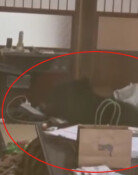[Editorial] Something Should Be Done about TV Broadcasting Service Abuse
[Editorial] Something Should Be Done about TV Broadcasting Service Abuse
Posted September. 12, 2005 07:02,
The leading actress of a TV drama went as far as to make an open protest against its unreasonable storyline designed for excessive product placement (PPL). Kim Jung-eun, who is playing the leading female role in the SBS drama Princess LuLu, confessed on the Internet that she finds it difficult to act as it seems to her that the drama continues merely to advertise all kinds of products in an indirect way. The broadcasting station has irresponsibly kept airing an ad-like drama, until the actress, who has been mocked as Princess Bidet on the ground that the title of the drama is the same as the name of the sponsoring companys bidet products, eventually took action.
Furthermore, it has belatedly been reported that unverified, exaggerated contents were broadcast on the KBS 1 TV program Wednesday Special. Three months ago, the broadcasting company released a documentary on a small-sized enterprise allegedly being the first around the world to commercialize electric automobiles, but it turned out later that the president of the outside production company that made the documentary was actually the elder brother of the small-sized enterprises president. This means that the state-owned TV channel, which is run on taxpayers money in the form of subscription fees, aired an overblown advertisement as a regular program.
Two years ago, KBS President Jeong Yeon-ju stressed in his inauguration remarks, In essence, the terrestrial media belongs to the citizens. Not to mention his arguments, publicness and public interests have been valued as the soul of broadcasting, for broadcasters are airing programs by using the public property of broadcasting services. This is why broadcasting companies sparing broadcast coverage of certain businesses or individuals is tantamount to embezzling public property.
Exploiting some parts of broadcasting coverage in pro-government code broadcasting as if they are the administrations private property is an anti-public abuse of broadcast authority. Sparing other parts of it for outside production companies and not verifying distorted facts within is a dereliction of their civic duty.
Broadcasting law stipulates, Advertisements and programs should be clearly distinguished to avoid any confusion. But the Ministry of Culture and Tourism (MCT) even plans to allow product placements by coining the term, sponsorship exposure, in an effort to boost broadcasters profits while evading the law. As in the case of Princess LuLu, product placements are quite rampant even now. In this regard, it is a matter of concern how worse this situationthe misappropriation and commercialization of broadcasting servicesmight get in the future. Infringements on the publics property rights should no longer be tolerated.







